Advanced Spanish Step-by-Step: Master Accelerated Grammar to Take Your Spanish to the Next Level (2012)
Part III. Future and Conditional Tenses; Past Subjunctive; Idioms
Chapter 13. The Imperfect Subjunctive
The imperfect subjunctive mood expresses past action. So far, you have studied the present subjunctive and the present perfect subjunctive. Next is the imperfect subjunctive. If the main clause begins in the past, it can cause the subjunctive in the past.
Remember that the subjunctive mood cannot exist alone. Another element in the sentence always causes it to be used. The imperfect subjunctive is used after the following elements:
• Certain impersonal expressions
• Certain verbs
• Certain conjunctions
• Certain dependent adjective clauses
• Certain expressions
Formation of the Imperfect Subjunctive
To form the imperfect subjunctive for all verbs, first drop the ending of the third-person singular of the preterit. What remains is the stem of the imperfect subjunctive for all forms.
Any irregularity in the stem of the preterit tense will have the same irregularity in the imperfect subjunctive.
Imperfect Subjunctive of -ar Verbs
To conjugate all but three -ar verbs in the imperfect subjunctive, begin with the third-person singular (él, ella, Ud.) of the preterit tense. Drop the preterit ending and add -ara, -aras, -ara, -áramos, -arais, -aran to the stem.
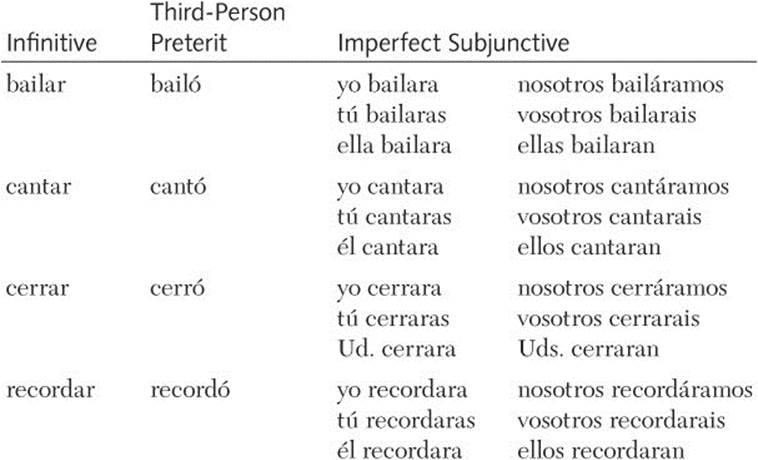
The only -ar verbs with different endings in the imperfect subjunctive are verbs that are irregular in the preterit: andar, estar, dar.
Imperfect Subjunctive of -er and -ir Verbs
To conjugate both -er and -ir verbs in the imperfect subjunctive, drop the ending from the third-person singular of the preterit to get the stem. Then add -iera, -ieras, -iera, -iéramos, -ierais, -ieran to the stem.
-Er Verbs
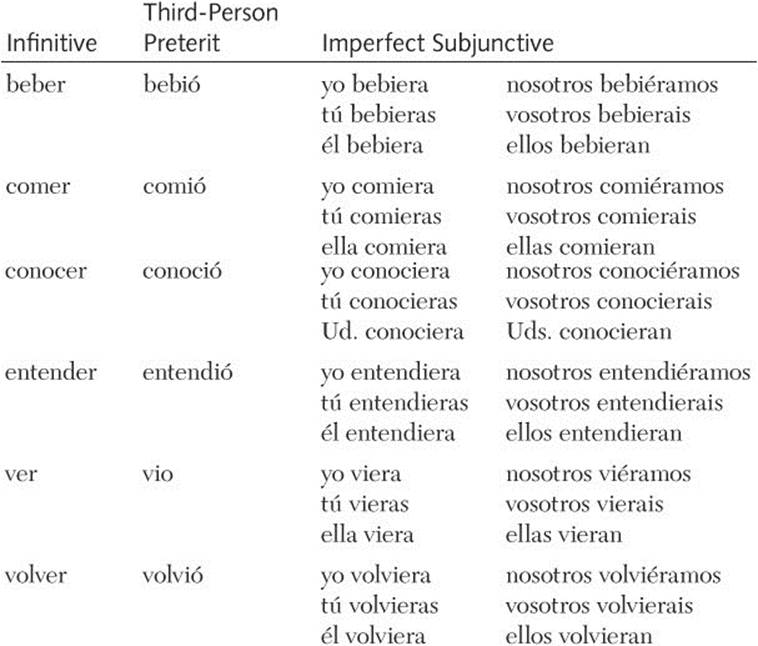
-Ir Verbs
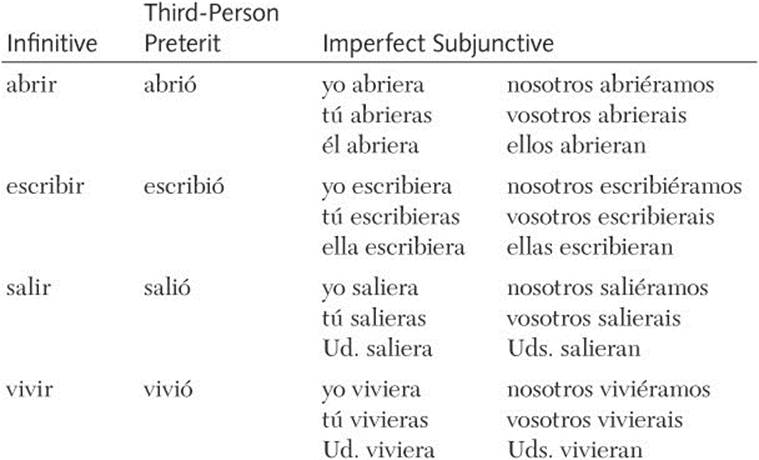
-Ir verbs that are irregular in the third-person singular of the preterit show the same irregularity in the stem of the imperfect subjunctive.
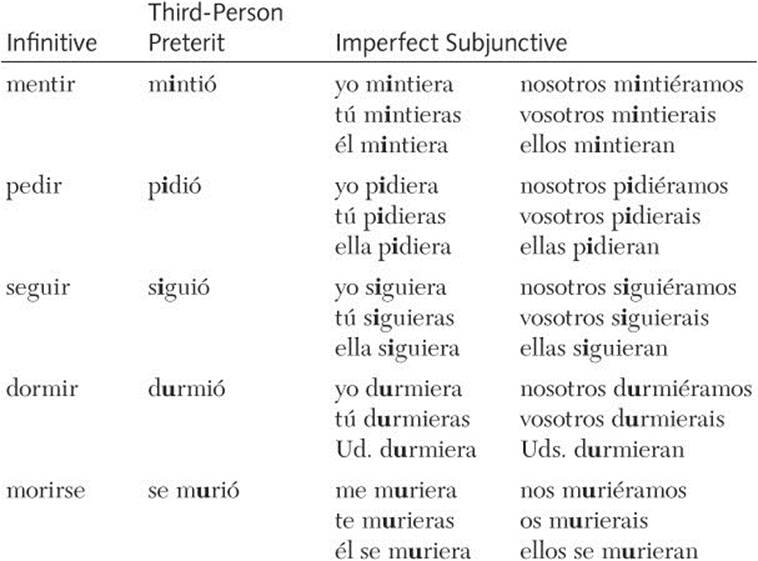
![]() A Word About Pronunciation
A Word About Pronunciation
The stress in the imperfect subjunctive is on the second-to-last, or penultimate, syllable. As you practice, make sure you pronounce the verbs in this way: yo cantara, tú cantaras, él cantara, nosotros cantáramos, vosotros cantarais, ellos cantaran. If a word carries a written accent, stress the accented syllable: nosotros cantáramos. The more you practice, the more natural this sound becomes.
Irregular Stems in the Preterit
Verbs with irregular stems in the preterit have the same irregularity in the imperfect subjunctive. Drop the ending from the third-person singular and add -iera, -ieras, -iera, -iéramos, -ierais, -ieran to the stem.
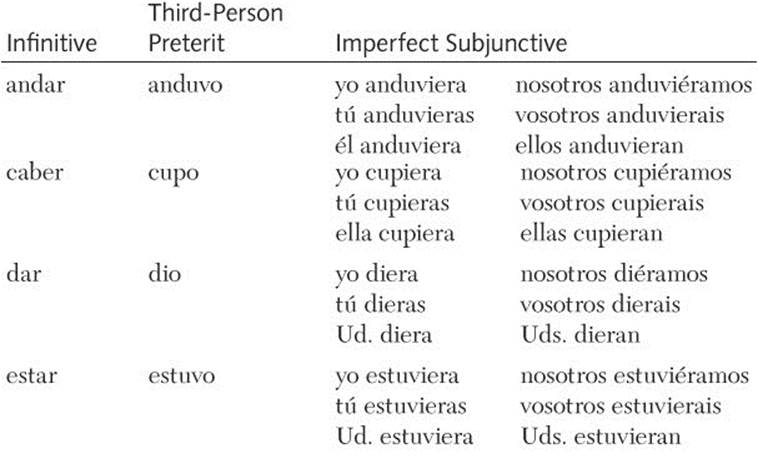
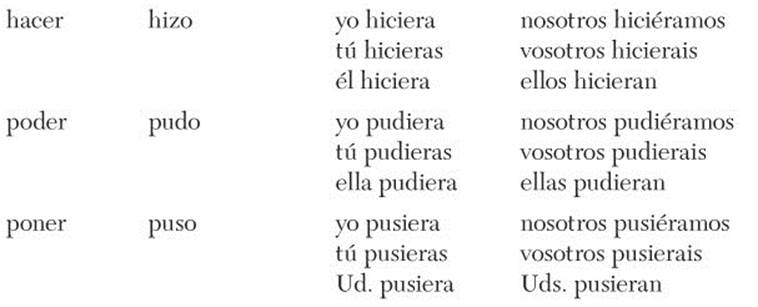
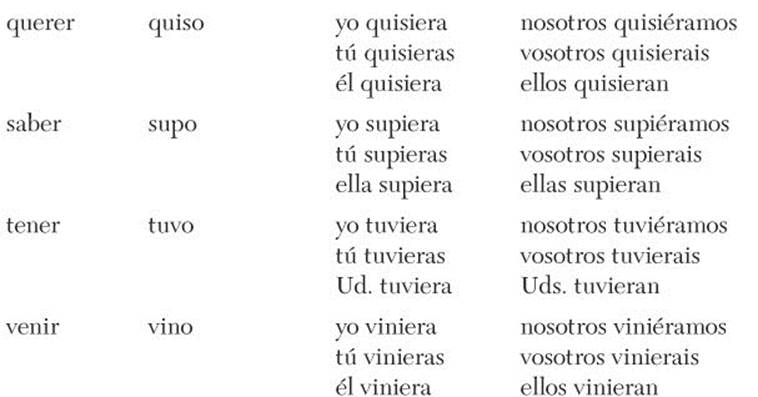
Irregular preterits whose stem ends in -j have -eran, not -ieran, in the third-person plural. Take a look at decir, producir, and traer.
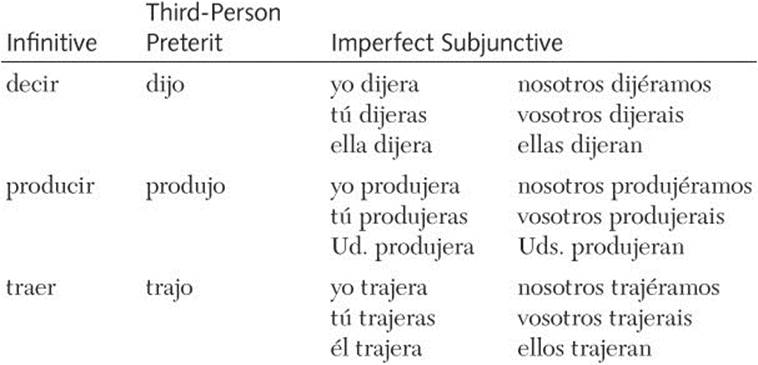
The conjugations for ir and ser are identical in the imperfect subjunctive. The meaning will be clarified in context.
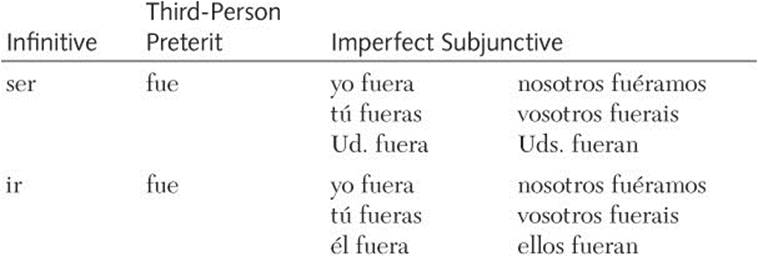
![]() A Word About haber
A Word About haber
Hubiera is the imperfect subjunctive form of haber, formed from the third-person singular of the preterit, hubo, meaning there was, there were.
Compound forms of verbs are conjugated in the same way as the main verb.
decir
![]()
hacer
![]()
poner
![]()
tener

producir
![]()
traer
![]()
venir
![]()
Uses of the Imperfect Subjunctive
When the main clause contains a verb or expression that causes the subjunctive in a dependent clause, the presence of an element in the main clause that begins in the past makes it mandatory to use the imperfect subjunctive in the dependent clause. You do not have to make any decisions, nor do you have a choice about whether or not to use it. The conditional can also cause the imperfect subjunctive in the dependent clause.
After Certain Impersonal Expressions
Certain impersonal expressions in the main clause will cause the subjunctive in the dependent clause.
If the impersonal expressions are in the preterit, the imperfect, or the conditional tense, they will cause the imperfect subjunctive in the dependent clause. Note the differences in the English translations for the dependent clauses below, depending on what is expressed by the verb in the main clause.
• Preterit

• Imperfect

• Conditional
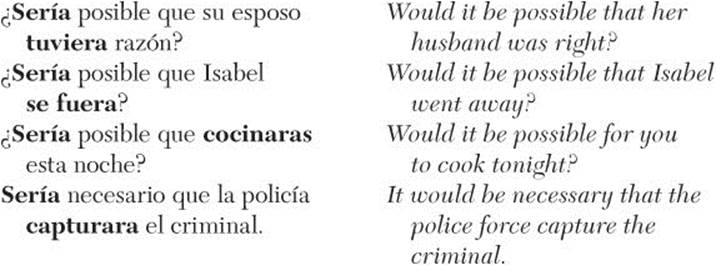
![]() Exercise 13.1
Exercise 13.1
Complete the following sentences with the correct imperfect subjunctive form of the verb in parentheses, then translate the sentence.
EXAMPLES Fue fantástico que nosotros tuviéramos éxito. (tener)
It was fantastic that we were successful.
Era imposible que Octavio durmiera bien anoche. (dormir)
It was impossible that Octavio slept well last night.
¿Sería posible que ellos me vieran en el teatro? (ver)
Would it be possible that they saw me in the theater?
1. Fue importante que Jaime me_________________________. (hablar)
2. Era una lástima que ella no_________________________bien anoche. (sentirse)
3. ¿Fue posible que Uds._________________________a mi hermana? (conocer)
4. Fue necesario que nosotros_________________________ejercicios. (hacer)
5. Era imposible que no_________________________tráfico hoy. (haber)
6. Fue urgente que la ambulancia_________________________dentro de cinco minutos. (llegar)
7. Era posible que nosotros le_________________________un regalo a la maestra. (dar)
8. Fue dudoso que mi sobrina me_________________________la verdad; fue posible que me_________________________. (decir/mentir)
9. Sería bueno que Uds._________________________. (mejorarse)
10. Era probable que toda la clase_________________________. (graduarse)
11. Sería imposible que Sara_________________________sin decirnos nada. (irse)
12. Fue bueno que nosotros la_________________________. (llamar)
13. Sería necesario que los turistas_________________________mucha agua en las montañas. (tomar)
14. Sería dudoso que nosotros_________________________a México este año. (viajar)
15. Fue posible que Beatriz e Isabel_________________________en Italia. (quedarse)
After Certain Verbs
Review the verbs that cause the subjunctive mood in a dependent clause, namely, verbs that express wishes and preferences; verbs that express hope, regret and emotion; verbs that express orders; and verbs that express uncertainty. These verbs in the main clause will cause the subjunctive mood in the dependent clause. If the main clause is in the preterit, the imperfect, or the conditional, the dependent clause will be in the imperfect subjunctive.
• Preterit
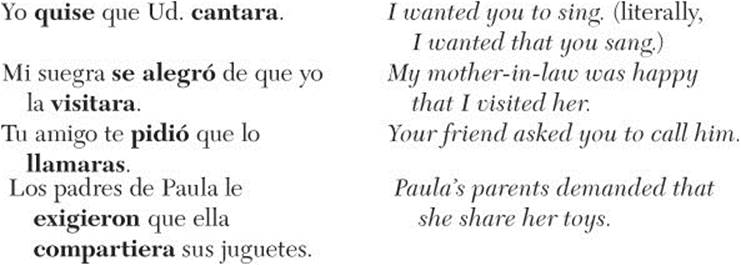
• Imperfect

• Conditional

![]() A Word About the English Translations
A Word About the English Translations
You can see that English translations of the imperfect subjunctive are not exact. Just remember that if you start out in either the past (preterit or imperfect) or the conditional in the main clause, the verb or impersonal expression will cause the imperfect subjunctive in the dependent clause.
![]() Exercise 13.2
Exercise 13.2
Translate the following sentences into English. In these sentences, the verb in the main clause is in the preterit and the verb in the dependent clause is in the imperfect subjunctive.
1. Quise que ellas me escribieran.
__________________________________________________
2. Mi vecino prefirió que yo no le trajera nada.
__________________________________________________
3. Nos alegramos de que él llegara temprano.
__________________________________________________
4. Ella nos rogó que no nos fuéramos.
__________________________________________________
5. Me alegré de que te mudaras a una casa.
__________________________________________________
6. El dueño insistió en que pagáramos la renta.
__________________________________________________
7. Yo le dije a mi amigo que me llamara.
__________________________________________________
8. El turista le sugirió al taxista que no condujera tan rápido.
__________________________________________________
![]() Exercise 13.3
Exercise 13.3
Complete the following sentences with the correct imperfect subjunctive form of the verb in parentheses. In these sentences, the verb in the main clause is in the preterit.
EXAMPLE El abogado insistió en que la mujer fuera a la corte. (ser)
1. Yo quise que Julio me_________________________en español. (hablar)
2. Julio me aconsejó que yo_________________________más. (estudiar)
3. Susana insistió en que su primo_________________________con su hermano. (bailar)
4. Manuel no quiso que su esposa_________________________en el cabaret. (cantar)
5. Me alegré de que Uds._________________________a la clase. (venir)
![]() Exercise 13.4
Exercise 13.4
Complete the following sentences with the correct imperfect subjunctive form of the verb in parentheses. In these sentences, the verb in the main clause is in the imperfect.
1. Ella quería que sus padres_________________________en Nueva York. (quedarse)
2. La madre no quería que nosotros le_________________________flores. (traer)
3. La doctora le aconsejaba al paciente que_________________________menos. (comer)
4. El hombre le sugería que Ud. me_________________________el libro. (prestar)
5. La mujer esperaba que nosotros la _________________________. (ayudar)
6. Los candidatos nos rogaban que_________________________por ellos. (votar)
![]() Exercise 13.5
Exercise 13.5
Complete the following sentences with the correct imperfect subjunctive form of the verb in parentheses. In these sentences, the verb in the main clause is in the conditional.
1. El dentista esperaría que sus pacientes_________________________en su oficina a las nueve de la mañana. (estar)
2. Me gustaría que tú_________________________. (callarse)
3. Ella se alegraría de que nosotros lo_________________________. (hacer)
4. Te gustaría que yo te_________________________al tren esta noche? (acompañar)
![]() Exercise 13.6
Exercise 13.6
Translate the following sentences into English.
1. El muchacho quería que sus padres le trajeran un regalo.
__________________________________________________
2. Los amigos de Miguel querían que él perdiera peso.
__________________________________________________
3. ¿Para qué querían Uds. que yo les prestara dinero?
__________________________________________________
4. Federico esperaba que Linda se casara con él.
__________________________________________________
5. La estudiante en España se alegró de que sus padres estuvieran orgullosos de ella.
__________________________________________________
6. Yo quise que ellos se quedaran conmigo.
__________________________________________________
7. Esperábamos que no fuera nada grave.
__________________________________________________
8. El marido no quería que su esposa se jubilara.
__________________________________________________
![]() Exercise 13.7
Exercise 13.7
Complete the following sentences with either the infinitive or the correct imperfect subjunctive form of the verb in parentheses. Read the sentences and questions carefully.
EXAMPLE El hombre flaco no quería comer el helado. (comer)
1. Yo no quería_________________________en el tren. Me gusta_________________________en la ducha. (cantar/cantar)
2. Es importante_________________________bien para_________________________bien. (comer/vivir)
3. Fue importante que los doctores_________________________a los pacientes. (cuidar)
4. El hombre esperaba que sus vecinos_________________________de escuchar música en alto volumen. (dejar)
5. ¿Por qué me dijiste que yo te_________________________? (esperar)
6. Susana le pidió a su hijo que_________________________. (acostarse)
7. La mujer no quiso_________________________en el ascensor. (bajar)
8. Antes de_________________________a México, Antonio llamó a sus amigos. (viajar)
9. Yo no creía que_________________________la verdad. (ser)
10. ¿Qué querías tú que yo te_________________________? (decir)
![]() Reading Comprehension
Reading Comprehension
El barco económico
Lucía siempre tenía ganas de ir a las Islas Galápagos y quería que su buen amigo la acompañara, pero no quiso. Después de haberlo pensado bien, decidió ir sola, primero a Quito, capital de Ecuador. Ella conoció a mucha gente en la ciudad, exploró los vecindarios durante el día; por la noche volvía a su hotel que le costaba cinco dólares. Ella comía el desayuno en una cafetería, el almuerzo en otra, y cenaba en un buen restaurante en el centro. Esperaba que alguien pasara por allí, que la viera sentada, que entrara en el restaurante, y que hablara con ella. Esperaba que los dos se llevaran bien y que él quisiera ir con ella a la isla.
Al fin y al cabo, Lucía viajó a Guayaquil, la entrada de las islas, y la salida de los barcos y cruceros. En la agencia de viajes, le sugirieron que fuera en barco económico con un grupo pequeño de aventureros. “Costaría menos,” dijo la agente, “y sería más divertido el viaje.” La agente la convenció.
La mujer tomó la decisión, compró su pasaje de ida y vuelta para el próximo día, y después de una noche inquieta e indecisa, abordó el barco chiquito. Aquella primera noche, el barco salió, y entre las olas, la tormenta, y el huracán, los ocho pasajeros pasaron la noche mareados bajo las estrellas centelleantes del cielo.
Verbos

Nombres

Adjetivos

Expresiones

Preguntas
1. ¿Cuántos pasajeros hay en el barco económico?
__________________________________________________
2. ¿Adónde fue Lucía?
__________________________________________________
3. ¿A ella le gustó Quito?
__________________________________________________
4. ¿Quién habló con ella en el restaurante?
__________________________________________________
5. ¿Qué decidió hacer?
__________________________________________________
6. ¿Piensa Ud. que los pasajeros se van a divertir?
__________________________________________________
After Certain Conjunctions
The subjunctive form follows certain conjunctions if the main clause has a different subject from the dependent clause.
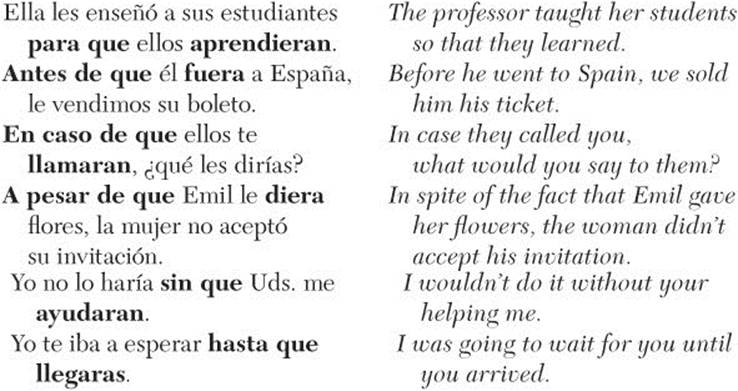
After Certain Dependent Adjective Clauses
The subjunctive mood is used in a dependent clause if the object or person described in the main clause of a sentence is indefinite or nonexistent. In the following examples, the objects and persons described in the main clause are not known.

After Certain Expressions
• ojalá
An interjection of Arabic origin, ojalá means would to God that or may God grant that and expresses great desire. It can also be translated as I hope.

• como si
A verb that follows como si (as if) will be in the imperfect subjunctive. The verb in the main clause can be in the present, the past, or the conditional.
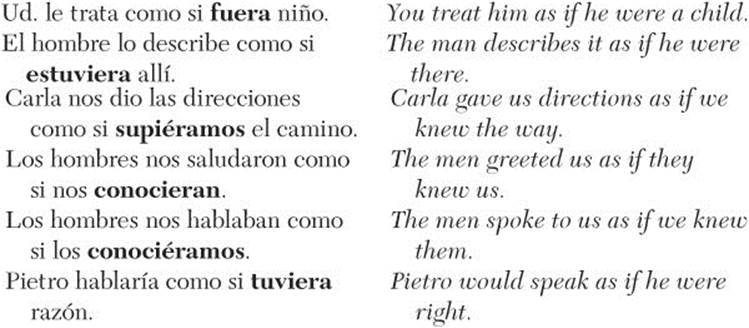
• quisiera
The verb querer can be used in the imperfect subjunctive in a main clause, where it is used to soften statements and questions. This form changes the translation of I want, for example, to I would like.

Compare the meanings of the following pairs of sentences:

• pudiera
The imperfect subjunctive form of poder can be used independently in a main clause. It is used to soften statements, for example, puedo (I can, I am able) to yo pudiera (I could, I would be able).

Compare the meanings of the following pairs of sentences:

![]() Exercise 13.8
Exercise 13.8
Complete the following sentences with either the infinitive or the correct imperfect subjunctive form of the verb in parentheses.
1. Sara habla sin_________________________nada. (saber)
2. La mamá prendió las luces para que sus hijos_________________________ver. (poder)
3. Él baila como si_________________________un bailarín profesional. (ser)
4. Ojalá que ella_________________________hoy. (venir)
5. ¿Había alguien que_________________________todas las capitales de los Estados Unidos? (saber)
6. Dolores preparó la comida antes de_________________________. (ducharse)
7. Ella preparó la comida antes de que su hijo_________________________para la escuela. (salir)
8. El niño no quiere_________________________las manos antes de_________________________. (lavarse/comer)
9. Elena y su hermana viajan como si_________________________mucho dinero. (tener)
10. Ojalá que Fernando nos_________________________la verdad. (decir)
11. Isabel nos contó todo como si ella_________________________allí. (estar)
12. Antes de_________________________a España, él estudió por dos años. (ir)
13. Íbamos a jugar tenis hasta que_________________________a llover. (empezar)
14. La enfermera no le daría medicina a la paciente a menos que ella la_________________________. (necesitar)
![]() Exercise 13.9
Exercise 13.9
Rewrite the following sentences in the past tense. Make sure you read the main clause carefully to see whether the subjunctive is necessary in the dependent clause.
EXAMPLES Yo sé que el tren viene. Yo sabía que el tren venía.
Yo dudo que el tren venga. Yo dudaba que el tren viniera.
1. Laura quiere que su esposo la acompañe a Chile.
__________________________________________________
2. Es necesario que la gente no fume en los edificios.
__________________________________________________
3. Julia está contenta de que Uds. estén aquí.
__________________________________________________
4. Yo sé que su nieta quiere ir a la universidad.
__________________________________________________
5. Me alegro de que puedas correr en el maratón.
__________________________________________________
6. ¿Qué quieres que yo haga?
__________________________________________________
7. Raúl y yo esperamos que Uds. se encuentren bien.
__________________________________________________
8. ¿Es importante que el carpintero sepa lo que está haciendo?
__________________________________________________
9. Espero que el vuelo de mis amigos llegue a tiempo.
__________________________________________________
10. Los deportistas dudan que ganemos el partido.
__________________________________________________
11. Nuestros amigos nos ruegan que no subamos a la cumbre de la montaña.
_________________________________________________
12. Los entrenadores insisten en que la gente haga más ejercicio.
__________________________________________________
![]() Exercise 13.10
Exercise 13.10
Translate the following sentences into Spanish.
1. It was necessary that she begin the lessons on time.
__________________________________________________
2. It was a pity that he didn’t know how to express himself.
__________________________________________________
3. Would it be possible that they had already left the reunion?
__________________________________________________
4. Joann’s children begged her not to smoke.
__________________________________________________
5. Would you like me to speak with your boss?
__________________________________________________
6. My brother doubted that I sang well yesterday.
__________________________________________________
7. My daughter’s teacher suggested that I call her.
__________________________________________________
8. I wanted them to stay with me. They wanted me to go with them.
__________________________________________________
9. I would like to make a documentary that is about the Incas.
__________________________________________________
10. I want to take your photo, if you don’t mind.
__________________________________________________
After si in a Contrary-to-Fact si-clause
When you express the idea that an action would happen (conditional tense) if another action occurred in the past, the imperfect subjunctive is used in the clause that begins with si.

![]() A Word About the si-clause in the Present
A Word About the si-clause in the Present
A si-clause used with a present tense verb never causes the subjunctive. When you express the idea that an action will happen (future tense) if another action occurs in the present, the imperfect subjunctive is not used.

In the following examples, a clause whose verb is in the conditional tense begins the sentence. Note that the imperfect subjunctive follows the word si. It doesn’t matter whether the sentence begins with the conditional tense or the si-clause, the subjunctive always follows si.
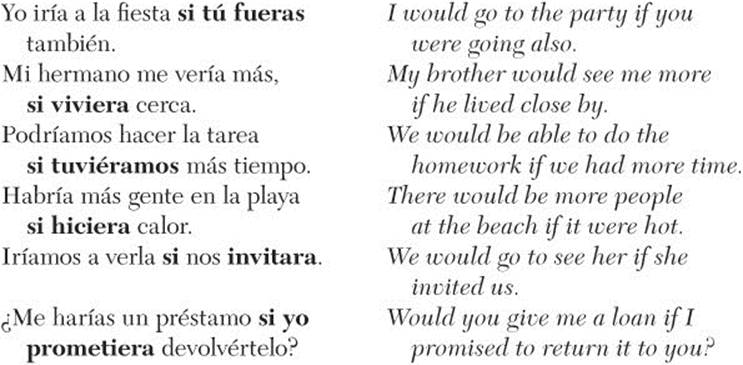
![]() Exercise 13.11
Exercise 13.11
Complete the following sentences with the correct form of the verbs in parentheses. Each sentence requires both the conditional and the imperfect subjunctive verb forms. Remember that the imperfect subjunctive follows the si -clause.
EXAMPLES ¿Qué haría Ud. si sus amigos le dijeran una mentira? (hacer/decir)
Si no hubiera tráfico, podríamos salir más tarde. (haber/poder)
1. Si Fernando_________________________más alto,_________________________deportista. (ser/ser)
2. Si a María le_________________________bailar,_________________________a fiestas. (gustar/ir)
3. Si nosotros le_________________________cartas, nuestro amigo nos_________________________. (escribir/responder)
4. Si yo_________________________mejor, yo_________________________reírme. (sentirse/poder)
5. Los artistas_________________________más dinero, si_________________________sus pinturas. (ganar/vender)
6. Los médicos dicen que los insomnes_________________________mejor si_________________________a la misma hora cada noche. (dormir/acostarse).
7. Nosotros_________________________con soltura si_________________________todos los verbos. (hablar/saber)
8. La muchacha no_________________________frío si_________________________la chaqueta. (tener/ponerse)
9. El niño no_________________________tanto si no le_________________________el estómago. (llorar/doler)
10. Yo no_________________________si Ud._________________________que yo_________________________. (irse/querer/quedarse)
If the sentence or question includes the word si in a sentence that is not contrary-to-fact, but rather is simply a statement, the subjunctive is not used.

![]() Reading Comprehension
Reading Comprehension
Xochicalco
(The place of the flowers)
Si Leonora pudiera viajar al pasado, ella viajaría al décimo siglo para averiguar por qué casi todos los centros de los mayas se habían desaparecido acerca del año 900 A.D. Nadie sabe la causa, según ella. Pienso que ella habría sido una buena arqueóloga por su curiosidad, pero me dijo que jamás le gustaba la idea de excavar la tierra, ni con máquinas, ni con las manos. Prefiere andar por las ruinas, sintiendo como era la vida en la edad de los mayas.
¿Has oído de Xochicalco, cerca de Cuernavaca, México? Supongo que no. Es poco conocido, pero magnífico, dice ella. La estructura principal se llama ‘la serpiente emplumada’ y ella se quedaba horas mirándola, tratando de entender lo que significa el arte del templo.
Me contó que quería subir la pirámide de Quetzalcóatl, pero no pudo. Un guía la vio intentar y la mostró como se hace. En vez de ascender recto, como hace casi toda la gente, él le dijo que subiera y bajara zigzagueando. De esta manera, escaló rápida y fácilmente.
¿Has oído de Ceibal en Guatemala? Por fin, Leonora fue con otro fanático de los mayas y estaba muy feliz con su compañero. Viajaron por barco por el Río Pasión. Me habría gustado acompañarla también, pero ella no pensaba en mí. De todos modos, ella y su amigo se enteraron que Ceibal, poblado en 900 B.C. y abandonado en 900 A.D., habría podido ser el centro de la civilización maya. En un sitio bien escondido, vieron estatuas de hombres negros y otras que parecían ser judíos. Estoy seguro que se divirtieron mucho.
Leonora quería que yo te recomendara otros sitios fantásticos para explorar. En el Yucatán, sería una maravilla que visitaras las ruinas de Tulum en la costa de México, o Chitzén Itzá entre Cancún y Mérida, Uxmal donde se ve estatuas de Chac, el dios de la lluvia, o Tikal, en Guatemala, una de las más grandes de todas. Y si vas, no te olvides de mí y el secreto del zigzag.
Verbos
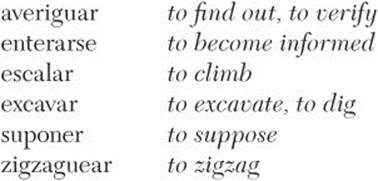
Preguntas
1. ¿Es hombre o mujer el narrador/la narradora?
__________________________________________________
2. ¿Cuántas personas hay en el cuento?
__________________________________________________
3. ¿Cuántas ruinas menciona la persona principal?
__________________________________________________
4. De las ruinas mencionadas en esta narración, ¿cuál es la más antigua?
__________________________________________________